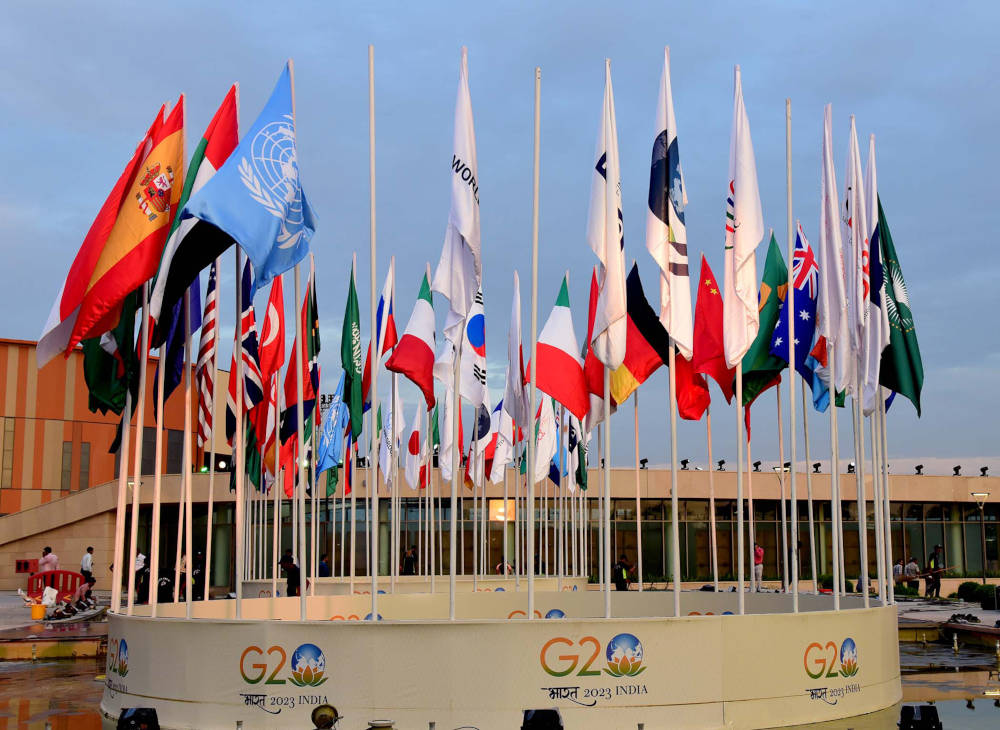[The 18th G20 Summit was held at Bharat Mandapam in New Delhi in September 2023. Photo via PIB]
Through December, we will publish a series of essays that offer fresh insight into the Events That Shaped Our World in 2023. You can follow the series here.
Indian diplomats consulted over 120 governments before the G20 summit. They discovered huge resentment among developing countries, especially in Africa, against the West. There were multiple reasons: a sense they were abandoned during Covid, left to drown in the inflationary wake of the Ukraine war, and receiving blank looks about the need for help to handle the huge economic costs being imposed on them in the name of climate.
But these same developing countries were also increasingly sceptical about China. Beijing’s years of extending high-interest, short-term loans were partly to blame for the debt crises inflicting many of these countries. The infrastructure goodies provided under the Belt and Road Initiative peaked in 2018 and, in their wake, left many over-leveraged and commercially unviable railway lines and ports. Overall Chinese external capital flows to these countries are now a quarter of their 2016 peak. And Beijing’s passive response towards the financial plight of supposed allies like Pakistan has not gone unnoticed.
Many of these countries asked whether India was ready to step up to the plate. Many of them were impressed by what they saw as India maintaining an independent path between the US and China, for example resisting sanctions against Russia. Others simply looked at the country’s GDP growth figures.
The Narendra Modi government, though its worldview does not automatically lend itself to a larger-than-life role in the international arena, is testing the waters. At the G20 India worked to create tangible solutions for what is now called the Global South, including increased green finance, encouraging biofuels, promoting open digital infrastructure and generally make a noise for the developing world. The biofuel alliance, for example, is designed to create a global ecosystem for a carbon-friendly vehicle fuel that does not require the enormous overheads of a full shift to EVs.
Conscious of how earlier developing country ideologies like the Afro-Asian bloc never went beyond rhetoric, New Delhi believes it has something to offer in its domestic digital accomplishments. Hence, its creation of a new mini-lateral One Future Alliance to promote digital infrastructure right after the G20. India avoids calling itself a Global South leader. Modi instead talks about a “new multilateralism” and how, at the G20, India “revitalised multilateralism, amplified the voice of the Global South, championed development.”
The US and Japan have expressed interest in partnering with India in its Global South efforts. Implicit is that these countries share India’s interest in rolling back China’s recent gains in the developing world. But it is also a recognition that India lacks the funding to push its ideas beyond a certain point. Hence India’s desire to show it can make an on-the-ground difference to developing countries in sectors that it feels it has an advantage.
The international system has a vacancy for a country that can provide answers to the technology and energy transition challenges facing many low-income countries. There is another vacancy for an emerging economy that can provide strategic coherence for other tier-two nations—reflected in the membership of the BRICS and other such bodies—as they navigate an increasingly disorderly world. It doesn’t help that the emerging economies hardly represent a united front. At the last BRICS summit in 2023 it was notable how India and Brazil squared off against China and Russia over the latters’ plans to make the body more overtly anti-Western.
What is clear is that there is an opening for a new player in the international system. What is not clear is whether India has the wherewithal to take on that mantle. But New Delhi plans to give it the old college try.
Dig Deeper
When India and China speak for Global South | Hindustan Times
How the Global South seized the spotlight at G20 summit in New Delhi | Frontline
The Global South: A new North Star | Kishore Mahbubani

